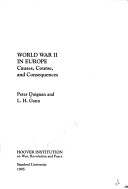Hoover Essays
3 primary works • 5 total works
Book 12
Fifty years after its conclusion, the ordinary newspaper reader has difficulty remembering that Hitler, for a time, ruled over most of the European continent. After the fall of France in 1940, only Britain and its empire held out. It was only in 1941 that the conflict became global, as both the Soviet Union and the United States were successively drawn into the maelstrom. The Wehrmacht proved formidable. But in the end, Nazi tyranny collapsed. By contrast, the Western democracies--widely stereotyped by their opponents as decaden--magnificently passed the test of war, and the United States turned into the "arsenal of democracy."
The war had many unintended side effects. The power of the state grew in every belligerent country. In Central Europe there was genocide, and there were vast population shifts. The United States ceased to be isolationist. The United States also provided a new economic role model to Western Europeans and helped to reconstruct Western Europe through the Marshall Plan and other devices. The United States helped defend Western Europe militarily through NATO. Democracy was rebuilt in Germany and Italy, thereby defying right-wing forecasts that fascism was the wave of the future. The United States profoundly influenced at the same time Western Europe's new consumer culture, economic management, and popular entertainment.
The war also accelerated Western decolonization in the Third World and thereby occasioned a worlwide power shift. Victory, for a time, also legitimized the Soviet system in the eyes of its citizens; victory expanded Soviet rule over East-Central Europe. World War II thereby engendered the cold war, which the Soviet Union would ultimately lose.
Book 14
World War II and the Beginning of the Cold War, Volume 14
by L H Gann and Peter Duignan
Once the fighting stopped, the East-West alliance soon fell apart. East-West collaboration was succeeded by a cold war for the next forty-five years. According to the authors, this conflict was not caused by anything that the Western powers did or failed to do. Not was the cold war occassioned by Russian imperialism of the traditional kind. The cold war, rather, was inherent in the structure of communist government in the Soviet Union. The Communist Party of the Soviet Union was moved by an inner dynamic--because peaceful coexistence between capitalism and the communism was impossible, the cold war was inevitable. The Communists in their aims went further than the most despotic czars. The authors outline the development of the Soviet strategy, its shifts and turns, as well as its enduring objective. The essay also compares nazism and communism and analyses the role of communist parties in the West and of fellow travelers and fronts in the communist offensive against the West. The writers take issue with revisionist historians who put the primary blame for the cold war on the Western powers, more specifically on the United States. Overall, containment, advocated by policy makers such as George Kennan, worked; the strategy in the long run proved even more successful than its originators could have anticipated.
Book 22
Bilingual Education
by Peter Duignan and Senior Research Fellow Hoover Institution Stanford University Past President John H Bunzel
The New Left and the Cultural Revolution of the 1960s
by L H Gann and Peter Duignan




